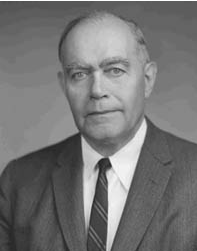William Elliott
( academic, deep state operative) | |
|---|---|
 | |
| Born | May 12, 1896 Murfreesboro, Tennessee |
| Died | Jan 9, 1979 (Age 82) |
| Nationality | US |
| Alma mater | • Vanderbilt University • Balliol College (Oxford) |
| Founder of | Harvard/International Seminar |
| Member of | Rhodes Scholar/1919 |
| Interests | • Milner Group • |
| Interest of | Charles Marshall |
Harvard professor at the center of the Deep State. Set up the Harvard International Seminar. | |
William Yandell Elliott was an American historian and a political advisor to six US presidents. He was Director of the Harvard Summer School (1949-60) where he would establish the Harvard International Seminar, directed by his student and protégé Henry Kissinger.
By the end of the 1930s, and increasingly through the 1950s and ’60s, he operated at the highest level of the strategic, quasi-military, quasi-intelligence institutions that have been successful in placing their own operatives in leading positions within the U.S. and other governments. According to some, this is an extension of the Round Table movement based around the Rhodes Scholarship.
A CIA consultant, He was a frequent lecturer at all sorts of strategic policy and “anti-communist” events, including at bankers' associations, U.S. War Colleges and military academies, at least up through the late 1960s.[1]
His associates and protegés include National Security Advisers McGeorge Bundy, Walt Rostow, Henry Kissinger, Zbigniew Brzezinski, and Richard Allen; Secretaries of State Kissinger and Dean Rusk; and foreign and domestic policy officials Samuel Huntington, Arthur M. Schlesinger, Jr., Paul Nitze, and Robert Bowie.
Early Life
Born in Murfreesboro, Tennessee, Elliott was the third in a line of “Tennessee Templars,” closely associated with the Masonic founders of the post-Civil War Ku Klux Klan[1]. He was an artillery battery commander in World War I.
He attended Vanderbilt University, where he was a member of the group of poets and literary scholars known as the Fugitives. As a Rhodes Scholar, he attended Balliol College, Oxford, where he read Philosophy, Politics and Economics and, among others, would meet the poet William Butler Yeats, the Indian nationalist Krishna Menon, and John Marshall Harlan II, a future Associate Justice of the Supreme Court. His dissertation The Pragmatic Revolt in Politics, completed under supervision of A. D. Lindsay, proved to be influential.
Career
He was hired by Harvard President Abbott Lawrence Lowell, and he was to remain at Harvard for the next 41 years. He became an advisor to a number of American presidents and presidential candidates, including Al Smith in 1928. He was a member of Franklin Roosevelt's Brain Trust in the 1930s and the 1940s and the Vice President of the War Production Board in Charge of Civilian Requirements during World War II. He also accompanied Roosevelt to the Yalta Conference.
After the war, Elliott served on the National Security Council. He was a scriptwriter for Republican Richard Nixon's 1960 election run, but Democratic Presidents John F. Kennedy and Lyndon Johnson retained him as a US State Department advisor.
Elliott signed a “personal services contract” with the CIA on March 23, 1949. Although he had an office in the CIA, his status was consultant. While consulting for the CIA he maintained his old congressional ties, as well as contacts with the War Production Board circle and. As a habitual “connector”, he linked his advocacy of putting the squeeze on America’s Western European colonial allies with specific proposals for legislation to this effect.
His his CIA connections went back to “Wild Bill” Donovan the founder of the proto-CIA Office of Strategic Services in the early 1940s. In 1947 Elliott had helped recruit both Allen Dulles, the future Director of the CIA, and Frank Lindsay, who along with Frank Wisner set up the covert action branch of the CIA, for the Herter Committee, and remained in close touch when both of them went to work for the Economic Cooperation Agency in Europe.
His work for the CIA seems to have been largely in the area of psychological warfare, or more broadly, “winning hearts and minds” in the Cold War. As a founding member of the American Committee for the Liberation of the Peoples of Russia in 1951, Elliott was involved with Radio Liberty, recruiting Eastern European emigres in an attempt to formulate an anti-Soviet message to Eastern Europe. He had a hand in was the Cultural Cold War, attempts to spread a positive message about the virtues of a free society, reinforced with cultural appeals in Western Europe.[2]
Harvard Summer School
He was Director of the Harvard Summer School (1949-60). From this position, he arranged to place his leading protégéHenry Kissinger as head of the International Seminar, serving at the same time as a high-level government policy adviser and official.[1][3]
His School and Seminar, as specified by its charter, brought “persons between the ages of 26 and 45 who are on the verge of reaching positions of leadership in their own countries,” including parliamentarians, academics, and others from around the world, in order to shape postwar strategic, educational, and cultural policy.[1]
Many attendees went on to become heads of state or government in their respective countries, including Yigal Allon in Israel, Yasuhiro Nakasone in Japan, and Pierre Trudeau in Canada.
One of his sons, Ward Elliott, is a notable political scientist. Other sons include the late Charles Elliott and David Elliott, both political scientists.
Elliott has become the recipient of recent attention, with Bilderberg house historian Niall Ferguson paying close interest to Elliott's role as Kissinger's mentor.
Further Reading
His son David wrote a biography of him, available at https://delliott.pressbooks.com/
References
- ↑ Jump up to: a b c d https://larouchepub.com/eiw/public/2002/eirv29n03-20020125/eirv29n03-20020125_029-william_yandell_elliott.pdf
- ↑ https://delliott.pressbooks.com/chapter/__unknown__-4/
- ↑ Shinagel, Michael (2010), The Gates Unbarred: A History of University Extension at Harvard, 1910–2009, Harvard University Press, p. 52, ISBN 978-0674051355
Wikipedia is not affiliated with Wikispooks. Original page source here